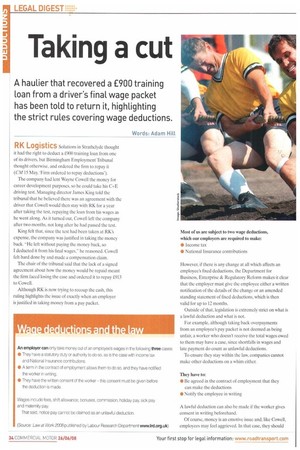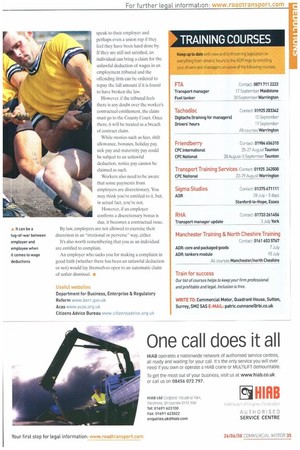Taking a cut
Page 34

Page 35

If you've noticed an error in this article please click here to report it so we can fix it.
A haulier that recovered a £900 training loan from a driver's final wage packet has been told to return it, highlighting the strict rules covering wage deductions.
RK Logistics Solutions in Strathclyde thought it had the right to deduct a £900 training loan from one of its drivers, but Birmingham Employment Tribunal thought otherwise, and ordered the firm to repay it (CM 15 May, 'Firm ordered to repay deductions').
The company had lent Wayne Cowell the money for career development purposes, so he could take his C+E driving test. Managing director James King told the tribunal that he believed there was an agreement with the driver that Cowell would then stay with RK for a year after taking the test, repaying the loan from his wages as he went along, As it turned out. Cowell left the company after two months, not long after he had passed the test.
King felt that, since the test had been taken at RK's expense, the company was justified in taking the money back. -He left without paying the money back, so I deducted it from his final wages," he reasoned. Cowell felt hard done by and made a compensation claim.
The chair of the tribunal said that the lack of a signed agreement about how the money would be repaid meant the firm faced losing the case and ordered it to repay £913 to Cowell.
Although RK is now trying to recoup the cash, this ruling highlights the issue of exactly when an employer is justified in taking money from a pay packet. Most of us are subject to two wage deductions, which our employers are required to make: • Income tax • National Insurance contributions However, if there is any change at all which affects an employee's fixed deductions, the Department for Business, Enterprise & Regulatory Reform makes it clear that the employer must give the employee either a written notification of the details of the change or an amended standing statement of fixed deductions, which is then valid for up to 12 months.
Outside of that, legislation is extremely strict on what is a lawful deduction and what is not.
For example, although taking back overpayments from an employee's pay packet is not deemed as being unfair, a worker who doesn't receive the total wages owed to them may have a case, since shortfalls in wages and late payment do count as unlawful deductions.
To ensure they stay within the law, companies cannot make other deductions on a whim either.
They have to: • Be agreed in the contract of employment that they can make the deductions • Notify the employee in writing A lawful deduction can also be made if the worker gives consent in writing beforehand.
Of course, money is an emotive issue and, like Cowell, employees may feel aggrieved. In that case, they should speak to their employer and perhaps even a union rep if they feel they have been hard done by. If they are still not satisfied, an individual can bring a claim for the unlawful deduction of wages in an employment tribunal and the offending firm can be ordered to repay the full amount if it is found to have broken the law, However, if the tribunal feels there is any doubt over the worker's contractual entitlement, the claim must go to the County Court. Once there, it will be treated as a breach of contract claim.
While monies such as fees, shift allowance, bonuses, holiday pay sick pay and maternity pay could be subject to an unlawful deduction, notice pay cannot be claimed as such.
Workers also need to be aware that some payments from employers are discretionary. You may think you're entitled to it, but, in actual fact, you're not.
However, if an employer confirms a discretionary bonus is due, it becomes a contractual issue.
By law, employers are not allowed to exercise their discretion in an "irrational or perverse" way, either.
It's also worth remembering that you as an individual are entitled to complain.
An employer who sacks you for making a complaint in good faith (whether there has been an unlawful deduction or not) would lay themselves open to an automatic claim of unfair dismissal. •
Department for Business, Enterprise & Regulatory
Reform www.berr.q.
Acas www.acasoarg.uk
Citizens Advice Bureau www.citizensadvice.org.uk








































































































































































